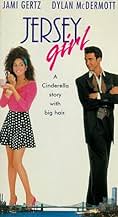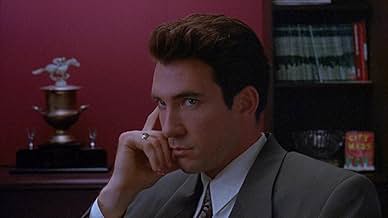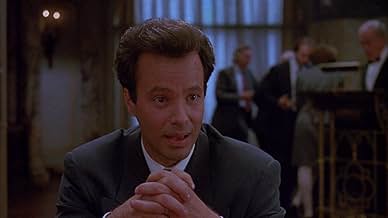NOTE IMDb
6,1/10
1,9 k
MA NOTE
Sal est un yuppie riche et triomphant qui, normalement, ne ferait pas tout pour avoir une femme. Mais cette fois, il s'agit de quelque chose de spécial et il est sur le point d'abandonner sa... Tout lireSal est un yuppie riche et triomphant qui, normalement, ne ferait pas tout pour avoir une femme. Mais cette fois, il s'agit de quelque chose de spécial et il est sur le point d'abandonner sa position pour son amour.Sal est un yuppie riche et triomphant qui, normalement, ne ferait pas tout pour avoir une femme. Mais cette fois, il s'agit de quelque chose de spécial et il est sur le point d'abandonner sa position pour son amour.
- Réalisation
- Scénario
- Casting principal
Amy Sakasitz
- Monica
- (as Amy Johanna Sakasitz)
Avis à la une
My review was written in July 1992 after watching the film at a Midtown Manhattan screening room.
Jamie Gertz gives a winning performance in "Jersey Girl", an unoriginal variation on such Italo-Yank romances as "Moonstruck". Not sharp enough to create much box office action, pic has the potential to warm the hearts of ancillary viewers, especially young women.
Just opened in England but not scheduled for American release until 1993, pic is an unusual low-budget entry backed by Interscope, which ordinarily delivers major product like the "Three Men and a Baby" pics.
It also marks a radical change of pace for indie director David Burton Morris ("Patti Rocks"), who handles the romance well but is ultimately done in by too much corn in Gina Wendkos's script.
Gertz is the prototypical young woman from New Jersey, living with her dad Joe Bologna (who fears her becoming an old maid) and working in a day care center. She spends much of her time hanging out at the local Bendix Diner with her pals Aida Turturro, Molly Price and Star Jasper.
Wendkos's main theme is that old standby: get out of your provincial rut and blossom. Instead of the "Working Girl" approach, Gertz takes a more old-fashioned route, trying to win some young hunk from Manhattan.
Staking her VW Beetle out in a Mercedes dealer lot, she "meets cute" with Dylan McDermott, a successful young graphics salesman. Gertz gets off on the wrong foot by causing a car accident that results in $6,300 damage to his new Mercedes, and she doesn't even have insurance. Her persistence pays off, however. When McDermott's blonde goddess girlfriend (Sheryl Lee) dumps him, he calls Gertz for a date. They soon end up in the sack, but Gertz is soon given the brush-off.
At this point, what has been a heartwarming picture about Gertz's Pollyanna-esque search for love becomes formula filmmaking. McDermott, as an Italian guy from Queens, is interested only in the fast-track of wealth and status, so he drops Gertz, who represents what he's left behind.
Unlike Mike Nichols' "Working Girl", which embraced the '80s ethos of success, "Jersey Girl" unconvincingly opts out of the rat race. McDermott rather arbitrarily becomes fed up with snooty girlfriend Lee and his back-stabbing boss, chucks his $100,000-plus job and wins back Gertz.
Movie audiences, especially women identifying with Gertz, might swallow some of this, but when McDermott proves his love to her by trashing his Mercedes, enough is enough.
Very attractively lensed by Ron Fortunato, Gertz shows a big talent in her first top-billed film appearance. McDermoot certainly looks the part but operates a notch lower, unwisely using a vocal timbre that recalls too closely Richard Gere in "Pretty Woman".
As tough-talking buddy Cookie, Molly Price is a terrific scene-stealer, with good support from gal pals Turturro and Jasper. Tech credits are good without any flamboyance or strong sense of style. A song score including tunes by local fave John Cafferty is effective.
Jamie Gertz gives a winning performance in "Jersey Girl", an unoriginal variation on such Italo-Yank romances as "Moonstruck". Not sharp enough to create much box office action, pic has the potential to warm the hearts of ancillary viewers, especially young women.
Just opened in England but not scheduled for American release until 1993, pic is an unusual low-budget entry backed by Interscope, which ordinarily delivers major product like the "Three Men and a Baby" pics.
It also marks a radical change of pace for indie director David Burton Morris ("Patti Rocks"), who handles the romance well but is ultimately done in by too much corn in Gina Wendkos's script.
Gertz is the prototypical young woman from New Jersey, living with her dad Joe Bologna (who fears her becoming an old maid) and working in a day care center. She spends much of her time hanging out at the local Bendix Diner with her pals Aida Turturro, Molly Price and Star Jasper.
Wendkos's main theme is that old standby: get out of your provincial rut and blossom. Instead of the "Working Girl" approach, Gertz takes a more old-fashioned route, trying to win some young hunk from Manhattan.
Staking her VW Beetle out in a Mercedes dealer lot, she "meets cute" with Dylan McDermott, a successful young graphics salesman. Gertz gets off on the wrong foot by causing a car accident that results in $6,300 damage to his new Mercedes, and she doesn't even have insurance. Her persistence pays off, however. When McDermott's blonde goddess girlfriend (Sheryl Lee) dumps him, he calls Gertz for a date. They soon end up in the sack, but Gertz is soon given the brush-off.
At this point, what has been a heartwarming picture about Gertz's Pollyanna-esque search for love becomes formula filmmaking. McDermott, as an Italian guy from Queens, is interested only in the fast-track of wealth and status, so he drops Gertz, who represents what he's left behind.
Unlike Mike Nichols' "Working Girl", which embraced the '80s ethos of success, "Jersey Girl" unconvincingly opts out of the rat race. McDermott rather arbitrarily becomes fed up with snooty girlfriend Lee and his back-stabbing boss, chucks his $100,000-plus job and wins back Gertz.
Movie audiences, especially women identifying with Gertz, might swallow some of this, but when McDermott proves his love to her by trashing his Mercedes, enough is enough.
Very attractively lensed by Ron Fortunato, Gertz shows a big talent in her first top-billed film appearance. McDermoot certainly looks the part but operates a notch lower, unwisely using a vocal timbre that recalls too closely Richard Gere in "Pretty Woman".
As tough-talking buddy Cookie, Molly Price is a terrific scene-stealer, with good support from gal pals Turturro and Jasper. Tech credits are good without any flamboyance or strong sense of style. A song score including tunes by local fave John Cafferty is effective.
On the surface of it, this movie is nothing special. However, there is something about the direction and the perfect casting that sways you to believe it. There are moments when you are wondering where the story will lead (but you're usually wrong) and the whole focus is on something that touches us all, whether we're from New Jersey, New York, London or Namibia: class, upbringing, love and prejudice, friendship, loyalty, and truth. Toby (Jami Gertz) plays a straightforward, if somewhat naive, go-getter with a big heart, and manages to steer clear of our disbelief, perhaps anchored somewhat by her down-to-earth girl buddies. The romance is touching, the bitter conflict of Sal's (Dylan McDermott) 'correct' relationship is deftly portrayed, and, sorry, but I have to say it, Gertz's beauty is dominant (but hey, I'm just a bloke). Lightweight with a Big Message for us all.
The Jersey Girl of 1992 (not to be confused with the Jersey Girl of 2004 I have seen both) gets kudos for being a warm, funny, and entertaining romantic comedy. As a native New Jerseyan of Italian ancestry who spent the first ten years of his life in Hackensack, however, I had mixed feelings about the film's portrayal of middle class New Jersey culture.
Sometimes they hit the nail on the head and I smiled with nostalgic recognition, as when Toby comes home with a grocery bag with a loaf of Italian bread sticking out of it that's an everyday Jersey occurrence. Ditto for her apartment above Foschini's bakery and a storefront Italian shop that sold ravioli and Italian sausage. Even the Bendix Diner evoked some nostalgia, but the producers may not have realized it is an anachronism. Most Jersey Diners no longer fit the 1950s stainless steel model most now have been expanded into Mediterranean-styled restaurants that basically look like Denny's but still have traditional diner food like Taylor Pork Roll sandwiches and home fries.
Most disturbing, though, was the portrayal of working class Jersey females as dumb bimbos who talk like grammar school dropouts and dress like prostitutes. Sure, I saw a few of those types from cities like Newark and Jersey City back in the '60s, but they are a thing of the past. Even urban areas of New Jersey like Hoboken and Jersey City have become too gentrified to reinforce a culture of gum chewing, slutty dressing bimbos. And Hackensack, where the story takes place, has become more affluent in recent years than it was when I grew up there in the 50s. My second grade teacher in Hackensack taught us how to pronounce words correctly, not like the girls in the movie who sound more like they're from Brooklyn.
And where on earth did the writers get the idea that people in New Jersey humbly look to New Yorkers as something to emulate? Most people I grew up with in Bergen County, looked DOWN on New Yorkers, especially the people from "the Boroughs." Maybe the writers should have read the demographics showing New Jersey is perennially tied with Connecticut as number one (or two) in the U.S. in per capita income.
These things didn't affect my enjoyment of the movie. They just made me think that the production staff was composed of typically ignorant and arrogant New Yorkers. You know, those jerks who come over to Jersey and drive below the speed limit in the left lane and refuse to move over as NJ law requires!
Sometimes they hit the nail on the head and I smiled with nostalgic recognition, as when Toby comes home with a grocery bag with a loaf of Italian bread sticking out of it that's an everyday Jersey occurrence. Ditto for her apartment above Foschini's bakery and a storefront Italian shop that sold ravioli and Italian sausage. Even the Bendix Diner evoked some nostalgia, but the producers may not have realized it is an anachronism. Most Jersey Diners no longer fit the 1950s stainless steel model most now have been expanded into Mediterranean-styled restaurants that basically look like Denny's but still have traditional diner food like Taylor Pork Roll sandwiches and home fries.
Most disturbing, though, was the portrayal of working class Jersey females as dumb bimbos who talk like grammar school dropouts and dress like prostitutes. Sure, I saw a few of those types from cities like Newark and Jersey City back in the '60s, but they are a thing of the past. Even urban areas of New Jersey like Hoboken and Jersey City have become too gentrified to reinforce a culture of gum chewing, slutty dressing bimbos. And Hackensack, where the story takes place, has become more affluent in recent years than it was when I grew up there in the 50s. My second grade teacher in Hackensack taught us how to pronounce words correctly, not like the girls in the movie who sound more like they're from Brooklyn.
And where on earth did the writers get the idea that people in New Jersey humbly look to New Yorkers as something to emulate? Most people I grew up with in Bergen County, looked DOWN on New Yorkers, especially the people from "the Boroughs." Maybe the writers should have read the demographics showing New Jersey is perennially tied with Connecticut as number one (or two) in the U.S. in per capita income.
These things didn't affect my enjoyment of the movie. They just made me think that the production staff was composed of typically ignorant and arrogant New Yorkers. You know, those jerks who come over to Jersey and drive below the speed limit in the left lane and refuse to move over as NJ law requires!
Here's the odd thing about this quirky little film -- its "happy ending" completely undercuts the happy ending the heroine is looking for.
Toby (Gertz) is a Jersey Girl looking for a GQ kind of guy -- a non-Guido with money, nice clothes and good manners who will take her away from it all. Sal (McDermott) is a Queens Guy who's made it big in Manhattan and is dating Social Register material. Toby wants Sal, Sal wants Society, but in the end Toby and Sal get each other. But what happens in order for this to occur? Sal trashes his well-paying career, is humiliated by his girlfriend, intentionally wrecks the Mercedes that first caught Toby's eye,and probably won't long be hanging on to that nice apartment overlooking Central Park. He rejects what it takes to be Manhattan material in order to be with his Jersey Girl -- he re-embraces his Queens roots.
So how does this make him different than the Guidos Toby has been fleeing in the first place? Are we supposed to believe that they're what she really wanted all along, now that she's ended up with one?
The toughest thing about this for me was the endless cliche about what Jersey Girls are like in the first place. I defy anyone to find a 20-something in, say, Short Hills NJ who would dress, act, talk, think like the stereotypes depicted in the film. It's a movie about Jersey Girls with a kind of Philip Roth-like self-hatred about being from Jersey. Toby isn't smarter or more stylish than her friends -- she just wants someone with money. That is supposed to ennoble her? In the end, she doesn't get the guy with the money anyway -- perhaps as fitting punishment for her greediness?
If so, then who's the heroine of this movie, anyway?
Toby (Gertz) is a Jersey Girl looking for a GQ kind of guy -- a non-Guido with money, nice clothes and good manners who will take her away from it all. Sal (McDermott) is a Queens Guy who's made it big in Manhattan and is dating Social Register material. Toby wants Sal, Sal wants Society, but in the end Toby and Sal get each other. But what happens in order for this to occur? Sal trashes his well-paying career, is humiliated by his girlfriend, intentionally wrecks the Mercedes that first caught Toby's eye,and probably won't long be hanging on to that nice apartment overlooking Central Park. He rejects what it takes to be Manhattan material in order to be with his Jersey Girl -- he re-embraces his Queens roots.
So how does this make him different than the Guidos Toby has been fleeing in the first place? Are we supposed to believe that they're what she really wanted all along, now that she's ended up with one?
The toughest thing about this for me was the endless cliche about what Jersey Girls are like in the first place. I defy anyone to find a 20-something in, say, Short Hills NJ who would dress, act, talk, think like the stereotypes depicted in the film. It's a movie about Jersey Girls with a kind of Philip Roth-like self-hatred about being from Jersey. Toby isn't smarter or more stylish than her friends -- she just wants someone with money. That is supposed to ennoble her? In the end, she doesn't get the guy with the money anyway -- perhaps as fitting punishment for her greediness?
If so, then who's the heroine of this movie, anyway?
Dylan Mcdermott fans must see this movie. The characters are not terribly complex or dynamic, but who cares....ITS A CHICK FLICK! Toby and Sal are sweet and romantic and if your a lover of girl movies, this one is a must see. Warm hearted and makes for a great stay at home movie night.
Le saviez-vous
- AnecdotesFilm debut of Molly Price.
- ConnexionsReferences Chorus Line (1985)
- Bandes originalesJersey Groove
Written by Steven Wills, Max Wills and May May (as Maryum Ali)
Performed by May May
Courtesy of Scotti Brothers Records, Inc.
Meilleurs choix
Connectez-vous pour évaluer et suivre la liste de favoris afin de recevoir des recommandations personnalisées
- How long is Jersey Girl?Alimenté par Alexa
Détails
- Durée
- 1h 35min(95 min)
- Rapport de forme
- 1.85 : 1
Contribuer à cette page
Suggérer une modification ou ajouter du contenu manquant



































